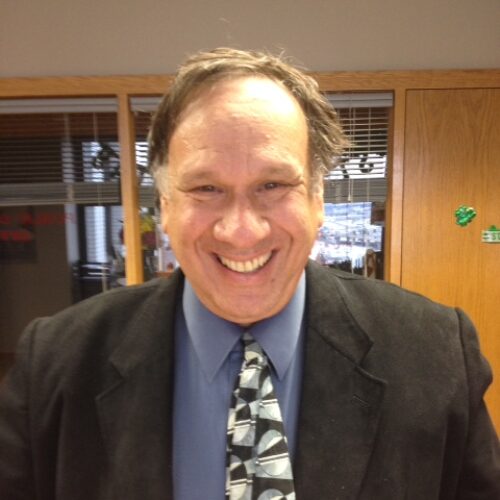Closing Arguments with Fred Friedman

“Closing Arguments” is a joint venture of the National Association for Public Defense (NAPD) and the Sixth Amendment Center (6AC). The 6AC regularly sits down with long-time right to counsel leaders nearing the end of their careers to share thoughts and to pass on lessons learned to the next generation. Today, we sit down with Fred Friedman, the chief public defender for Minnesota’s 6th Judicial District (Duluth).
The Minnesota Board of Public Defense is a state-funded, seven member commission whose members are appointed by the state supreme court (4) and the governor (3). The Board oversees the delivery of public defense services in the state’s ten judicial districts. In each district, the Board appoints a chief public defender that manages all public defense services within the district, including both full-time and part-time defenders. In other words, the Board sets policy but it is the local chief acting with great autonomy that is responsible to ensure compliance with Board standards.
Fred retires March 31, 2014, after being a public defender for more than 40 years.
6AC: How did you become a public defender? Did you take a circuitous route or was it a passion since law school?
FF: Mine is a direct route from law school to being a public defender. I was born in Chicago where my father gave his career to battling for child labor laws and against employers not paying minimum wage. He was transferred to Fort Wayne, Indiana and finally to Duluth. So growing up, I experienced him fighting for the underprivileged, while witnessing firsthand the civil rights movement through the prism of a large urban metropolis (Chicago), a place where racism and bigotry were commonplace (Fort Wayne), and then from a bastion of liberalism here in Northeast Minnesota.
Public defense, for me, was a direct flow from the civil rights movement. I debated in college and high school for seven years, so I was trained to think on my feet. After law school, I volunteered in first appearance court helping out indigent folks, and knew it was what I wanted to do.
I should mention that I also spent many, many years shooting pool in pool halls probably rubbing shoulders with future clients. That taught me about people and how, even though some people never finish school, they can still know a whole lot about geometric principles!
6AC: The Minnesota indigent defense system relies to a large extent on “part-time” public defenders. On the surface, that seems like a controversial proposition. Why does it work in your state?
FF: Well, I know that the 6AC says a functioning indigent defense system is more about meeting national standards than the delivery model and I agree with that. Part-time defenders offer a lot of benefits to a system so long as they are properly qualified, trained and supervised as required by the ABA Ten Principles.
My region is right across Lake Superior from the Upper Peninsula of Michigan. I understand that a non-qualified, untrained, non-supervised part-time defender there is just a flat-fee contract in disguise. That is not how it works here. First of all, people should know that “part-time” defenders are much more akin to the private bar in other states. The difference is that by becoming a part-time defender the private attorney is getting state benefits, like medical insurance. We also provide free of charge all the necessary training for those attorneys choosing to be involved in the system. Those two things are a great incentive to keep the private bar active in the right to counsel system.
The ABA Ten Principles says that every system should involve both full time staff offices and the participation of the private bar. We have that here in Minnesota. Whereas a place like Wisconsin looks like they have a similar system, they don’t. Once the public defender calls a conflict, they no longer have any mechanism to ensure that the representation for that client is effective. We on the other hand have on-going supervision, mentoring and training to make sure co-defendant number one gets the same uniform treatment as co-defendant number two.
6AC: That’s great. But despite your adherence to the Principles, Minnesota defenders had their own battles with excessive caseload. Generally speaking, many of our nation’s excessive caseload crises are occurring in places – like Missouri – where there is not a healthy participation by the private bar in the system. How do you explain that?
FF: Even the best systems are going to have financial push back from time to time. The strength of a system is really determined on how it responds to those tough times.
Minnesota, like many states, suffered from the financial meltdown of 2008. We were overburdened and our supervisors were having difficulty carrying cases and providing proper supervision. However, because the private bar is actively involved in the system, groups like the Minnesota Association of Criminal Defense Lawyers and the State Bar Association were quickly brought in to the battle. The Board of Public Defense has a person that is in the legislature every single day on our behalf. Our independence allowed lawyers in eleven counties to file labor grievances against the state due to workload concerns without fear of retribution. The system was designed to persevere through.
I am the first to say that everything is not perfect in our state – we don’t have enough funds for expert witnesses, and we have an inconsistent approach to representing people at initial appearance because of resource challenges – but our caseloads have come way down because the system was independent enough to fight the fight when needed.
6AC: What do you see as some of your greatest accomplishments?
FF: For my district, I am most proud to have overseen the growth of the system that began with no full time defenders at all to an office of nine full-time lawyers today. I spoke about the benefits of having the active participation of the private bar, but there is a benefit to full time staffed offices too. We have a defender participating on every criminal justice committee, both local and statewide. Our office maintains close ties to the state and local bar associations, state and Federal courts, the schools and colleges, the clergy, professional groups, civic organizations, minority advocacy organizations – even the District Attorneys Association. It is through those relationships that we have not had to fight many of the battles other states do. For example, Minnesota maintains no death penalty and we have very low prison rates.
6AC: Let me stop you there for a moment. We often say that a strong functioning public defender system will, or can, result in reduced jail and prison populations. Do you believe that to be the case in Minnesota?
FF: I do. Strong advocacy starts at the front end, knowing that clients do better if they are out of jail pre-trial. Having a well-trained, competent attorney advocating from the outset increases the possibility that an appropriate disposition will occur. We can suggest options for our clients, whether diversion or drug treatment or something other than the crazy expense of keeping someone locked up.
In my career, I have had the opportunity to do a lot of national work so I have seen for myself how deficient systems just triage all the time – no client contact, no attempts to understand the life issues in a client’s life. I was in one jurisdiction where attorneys refused to give clients a way to contact them. It’s crazy. Of course, broken systems are not going to care as much for what happens to the client – they are just part of the assembly line processing people into jail.
6AC: You also mentioned that you work closely with district attorneys. Is that a product of more progressive DA’s in Minnesota or is it something else?
FF: It’s really a respect thing. I, for example, never attack a district attorneys’ budget request. When you define the battle as “us verses them,” the public defense providers are bound to lose. Parity is important, but I always talk about it in terms of parity of salaries, parity of benefits, etc. We have that type of parity in Minnesota. Even though we are state employees and district attorneys are county employees, we have salaries that are comparable in almost all districts. Our chiefs get the same salaries as presiding judges. I have to say that cuts down on defense attorneys jumping to the prosecutor’s side or wanting to go on the bench purely for financial reasons, and leads to a professional defender function.
But the prosecutor and defender parity debate is really an apple to oranges comparison. We do not have to be fighting against every new toy they want so long as we have the resources to do our job. Out of that comes a respect to work together to build a responsible criminal justice system.
6AC: We agree. In far too many jurisdictions we see public defenders that have what we call a “bunker mentality” – they refuse to engage in the process and feel a bit righteous in being able to paint prosecutors as the evil empire. Don’t get me wrong, I know that the lack of independence is generally at the root of the bunker mentality, but I also know prosecutors in many states have been a great help in rectifying deficient systems. Any suggestions for helping public defenders move beyond their biases?
FF: Public defenders need to be out in the community. Otherwise, we let others paint us with their biases. You can be both an advocate and get along. Besides being a life-long public defender, I teach at the University of Minnesota at Duluth. Every fall, I teach a course on sociology and criminology at the undergraduate level. These are people that will go onto to criminal justice careers – probation, law enforcement, social workers – who are taught early on about the benefits of a functioning criminal justice system. I also teach a course on medical law too.
I think those experiences inform how you learn to talk to others. The bunker mentality as you call it prevents that. I am famous for having one personality in court and the jails, and another in the classroom. Teaching is more about getting people to think. Lawyering is about giving people information about their cases and the law and offering advice, but the clients are the ones making the decisions. Both involve advocating for folks who often put their trust in you. You learn different skills while educating others.
6AC: Along the same lines, I understand you have a public radio show too. Who is “Fool Fred”?
FF: Every Thursday, I host a call-in show broadcast throughout Northern Minnesota. We really talk about any thing that anyone wants to talk about – sports, politics, or weather … whatever! And, I’ll tell you my involvement in the media has really helped me learn to talk in short sound bites. It is a skill that helps on all sorts of fronts, including the elevator conversation with a policymaker or before a judge.
6AC: Any parting words of wisdom for the next generation of leaders from “Fool Fred”?
FF: I thought the right to counsel would have moved a lot faster than it has, but you have to keep fighting. First, I think public defense should not be a county government function. I know that there are great county defender programs out there, but they are the exception, not the rule. I mean, just look at Pennsylvania and how bad the system is there despite Philadelphia. County defender programs are more apt to be dominated by politics, whether by uninformed county supervisors or judges. The public defense world should be professionalized not politicized.
So the next generation needs to engage in structural reform, and look for courteous yet zealous ways to speak up for the underprivileged. Sell your jurisdiction that being a public defender is an honor and something to aspire to. Coach and support and mentor your folks every single day. Become involved nationally. Collaborate with your peers across America.
And, most important, never permit yourself or your organization to be pushed around.


